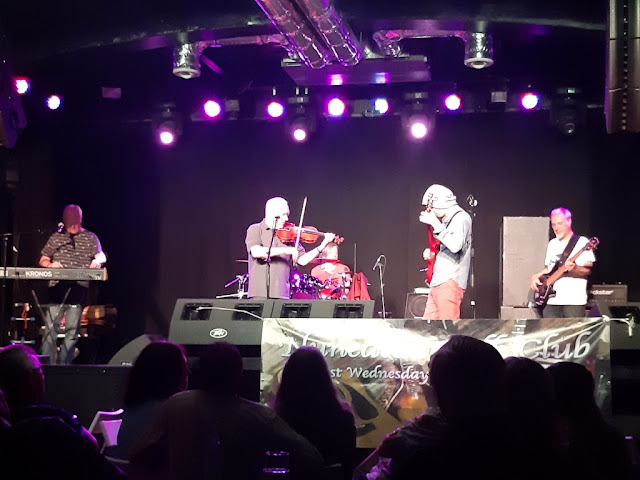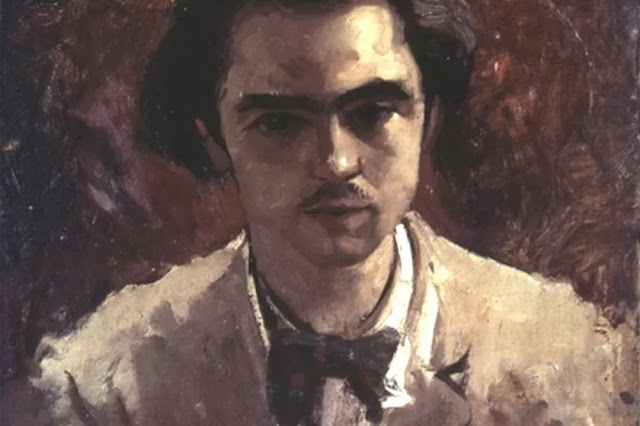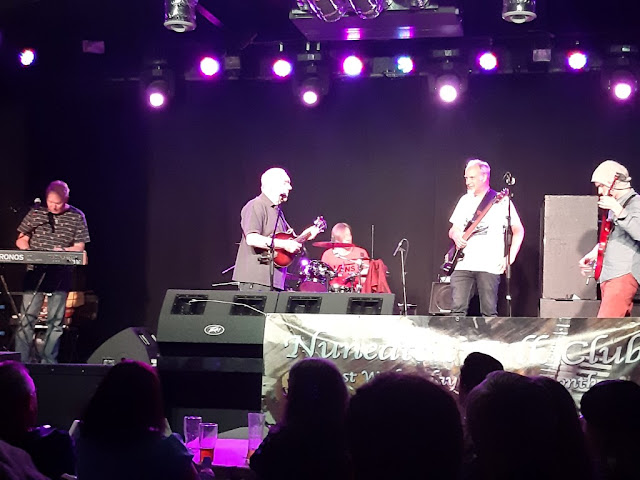‘Les sanglots longs
/ des violons / de l’automne’ (‘Long
sobs of autumn
violins’) is a poem by French poet, Paul Verlaine (1844–1896), and
was first published during 1866. During World War 2 lines from the poem were
used to send messages from the Special Operations Executive to the French
Resistance about the timing of the forthcoming invasion of Normandy, otherwise
known as the D. Day landings. They were used as a code if you like.
The poem is in fact
referred to during the 1962 epic war movie ‘The Longest Day’. And local
resident and violinist, Joe O’ O’Donnell, has long been intrigued by this poem.
So much so that it is featured in Joe’s latest musical project. More than that,
Joe has made the whole project relevant to the City of Coventry.
During the 1970s,
when Joe was a member of folk rock band East of Eden. One tour saw East of Eden
supporting the Climax Blues Band. East of Eden were instructed to plug
themselves into the Climax Blues Band’s back line equipment. And Joe found
himself plugged into sax player, Colin Cooper’s, Leslie Cabinets. This was not
what he was used to and for Joe it was a revelation. From behind him and
through the monitors the sound was astonishing. It felt as though he was inside
large rotating cabinets.
During the 1960s
and 70s Leslie Cabinets were incredibly popular and very difficult to acquire.
Together with the Hammond Organ they were the perfect fit. And these
instruments featured on many great albums from that period. But it wasn’t until
Joe moved to Guernsey during the 1980s that the opportunity arose for him to
buy these prized cabinets. Joe noticed an advert for a Leslie. But when he
arrived to buy it, the seller offered him a second. They were in almost mint
condition and hardly played. Joe adapted them for violin and, in Joe’s words,
‘there is not a sound like it’.
After relocating to
Coventry during the 1990s Joe was quickly get to know fellow musicians around
the city. After filling in on a gig Joe ended up at, of all places, Foleshill
Road Fire Station. He had been invited to play his violin there. But what
struck Joe was this incredible feeling of ambiance from the building. That then
led him, sometime later, to record the sound of his violin through those Leslie
Cabinets at 3 locations around the city. The Guildhall, the Roman Fort at
Baginton and the New Cathedral. He fed in on the natural acoustics and ambience
of those settings and drew that into the Leslie cabinets and back out again.
While at the Cathedral the Long Sobs poem came back to Joe. It just seemed to
fit in with feel of it all. And the Long Sobs became central to the entire
project.
What had began as
an avant garde project has, over time, evolved into a suite of music. The
original recordings have now been overdubbed with authentic war time sounds
which would have been heard during the Coventry blitz. These include aircraft
engines, ambulance bells, Ack Ack guns, air raid warnings. Joe even discovered
recording’s of the original bells from the old Cathedral Tower. And these would
have been heard prior to the cathedrals destruction. And all of these sounds have
been mixed into the recording process.
The Long Sobs
project has been, and still is, a work in progress for a number of years.
Recently, however, it has began to gain traction. The arts council have shown
an interest. And have been most helpful by accepting a bid for a development
grant. This broad based suite of music runs in at around an hour and a quarter.
It is similar in feel to an orchestral piece in that it is built up of several
movements. It takes you on an emotional journey.
When live theatre returns
there are plans for an ambitious interactive concert. The hope is that Joe’s
band, Shkayla, are accompanied by an on screen orchestra and choir. Adding to
the overall audience experience their would also be narration and sound
effects. And penciled in as the setting for this spectacle is the Albany
Theatre in Earlsdon. Watch this space.
On June 1, to tell the resistance to stand by for further alerts, the BBC transmitted the first three lines:
Les sanglots longs
Des violons
De l’automne
Then, on June 5, to signal that sabotage efforts should begin, the next three lines were sent:
Blessent mon coeur
D’une langueur
Monotone
Des violons
De l’automne
Blessent mon cœur
D’une langueur
Monotone.
Tout suffocant
Et blême, quand
Sonne l’heure,
Je me souviens
Des jours anciens
Et je pleure;
Et je m’en vais
Au vent mauvais
Qui m’emporte
Deçà, delà,
Pareil à la
Feuille morte.
Translation
The prolonged sobs of the violins
of autumn
wound my heart with their
monotonous languor.
All breathless and pale,
when the hour sounds,
I remember former days
and I cry;
I am carried on an ill wind
which tosses me
here, there,
like a dead leaf.



